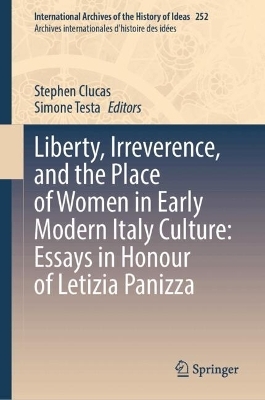
Liberty, Irreverence, and the Place of Women in Early Modern Italian Culture: Essays in Honour of Letizia Panizza
Springer International Publishing (Verlag)
978-3-031-72297-4 (ISBN)
- Noch nicht erschienen - erscheint am 01.01.2025
- Versandkostenfrei
- Auch auf Rechnung
- Artikel merken
This book brings together essays from a range of disciplines within Early Modern Italian Studies, which focus on research areas pioneered by the prestigious Italianist, Letizia Panizza. The essays cover numerous themes, mirroring Panizza's broad scholarly interests, and refusal of artificial disciplinary separations. Contributions come from the fields of women's history, cultural history, intellectual history, political philosophy, and art history. They span from Giordano Bruno and the Renaissance interest in the lives of classical philosophers to the poetry of women in the Italian academies, representations of women in Ludovico Ariosto's Orlando Furioso, and the poetry of Piero de Medici. The volume ends with essays on religious parody, libertinism, and controversial political writings. This book presents original new work by leading scholars in the intellectual, cultural and literary history of early modern Italy and is aimed at scholars of intellectual history, history of philosophy, literary history, women's studies and Italian history.
Dr. Stephen Clucas is Emeritus Professor of Early Modern Intellectual History at Birkbeck, University of London. He was founding co-editor (with Stephen Gaukroger) of the journal Intellectual History Review (2007–2020). He has published widely on various aspects of sixteenth- and seventeenth-century intellectual history, including several articles on the mnemotechnics of Giordano Bruno, some of which have been republished in Magic, Memory and Natural Philosophy in the Sixteenth and Seventeenth Centuries (2011). He is currently co-editing Thomas Hobbes’ De corpore (with Timothy J. Raylor) for the Clarendon Edition of the Works of Thomas Hobbes. Simone Testa (PhD, Royal Holloway, University of London) teaches at the International Studies Institute, Florence. A scholar of sixteenth- and seventeenth-century Italian culture with particular focus on political literature and intellectual networks, his publications include Scipione Di Castro e il suo trattato politico con una traduzione inglese inedita del Seicento (Manziana [Rome], Vecchiarelli, 2012); Italian Academies 1500–1700. From Local to Global, (New York and Basingstoke: Palgrave, 2015). He also wrote the script for the graphic novel Vita di Niccolò Machiavelli fiorentino (Argelato: Minerva, 2019). He has been full-time Post-doctoral Researcher on the AHRC Italian Academies collaborative research projects (Royal Holloway, British Library, and University of Reading), Post doctoral researcher at the University of Manchester, and has held fellowships at the John Rylands Research Centre (Manchester), the Newberry Library (Chicago), the Harry Ransom Center (Austin, Texas), and The European University Institute (Fiesole).
Chapter 1. Introduction (Clucas and Testa).- Chapter 2. Between Convent and Apothecary: Women authors inspired by Alessandro Piccolomini's Natural Philosophy (Carinci).- Chapter 3. Arcangela Tarabotti and the 'missing years' (1617-1643) (Medioli).- Chapter 4. In and Out the Baroque Palace: Noblewomen and Urban Space in Seventeenth-Century Rome (Cavallo).- Chapter 5. Three little-known portraits of Beatrice d'Este and Isabella d'Este as a commissioner of family portraits (Damianaki).- Chapter 6. Medieval and Humanist Misogyny: Alberti's translation of Walter Map (McLaughlin).- Chapter 7. Philosophical Lives in the Renaissance (Sellars).- Chapter 8. Giordano Bruno to Sir Philip Sidney: Two Dedicatory Letters (Gatti).- Chapter 9. Mnemosine in London: the Art of Memory and Giordano Bruno's Dialoghi Italiani (Clucas).- Chapter 10. Celebration, commemoration and compensation. Rare and learned ladies in the Italian Academies (Everson).- Chapter 11. Piero de' Medici's poems in the context of his life and letters (Brown).- Chapter 12. The Afterlives of Ariosto's characters: Rewriting the episode of Fiordispina in early modern Ovidian epistles (Aneolotti).- Chapter 13. 1735: Machiavelli on the Index. The trial against the Marchese Bernardo del Grillo for possession of forbidden books (Fattori).- Chapter 14. Per mantenere la bona unione et intelligenza che è e deve essere tra il Papa e quella Republica': Interest of the state in Giovanfrancesco Peranda's instruction to the Papal nuncio to Venice (Testa).- Chapter 15. An Irreverent Confession in a Florentine Rustic Comedy (Richardson).- Chapter 16. Bibliography of Letizia Panizza (Haskins).
| Erscheint lt. Verlag | 1.1.2025 |
|---|---|
| Reihe/Serie | International Archives of the History of Ideas Archives internationales d'histoire des idées |
| Zusatzinfo | Approx. 380 p. 15 illus., 13 illus. in color. |
| Verlagsort | Cham |
| Sprache | englisch |
| Maße | 155 x 235 mm |
| Themenwelt | Geschichte ► Teilgebiete der Geschichte ► Kulturgeschichte |
| Sozialwissenschaften ► Politik / Verwaltung ► Politische Theorie | |
| Sozialwissenschaften ► Soziologie ► Gender Studies | |
| Schlagworte | Alessandro Piccolomini • Arcangela Tarabotti • Camilla Erculiani • Elena Lucrezia Cornaro Piscopia • Elisabetta Sirani • Fiammetta Frescobaldi • Florentine comedy • Giordano Bruno • Isabella d'Este • Italian Academies • Italian studies • Leon Battista Alberti • Ludovico Ariosto • Niccolò Machiavelli • philosophical biography • Piero de Medici • Reason of state • Renaissance Philosophy • Thesoro politico • Women's history |
| ISBN-10 | 3-031-72297-3 / 3031722973 |
| ISBN-13 | 978-3-031-72297-4 / 9783031722974 |
| Zustand | Neuware |
| Haben Sie eine Frage zum Produkt? |
aus dem Bereich


